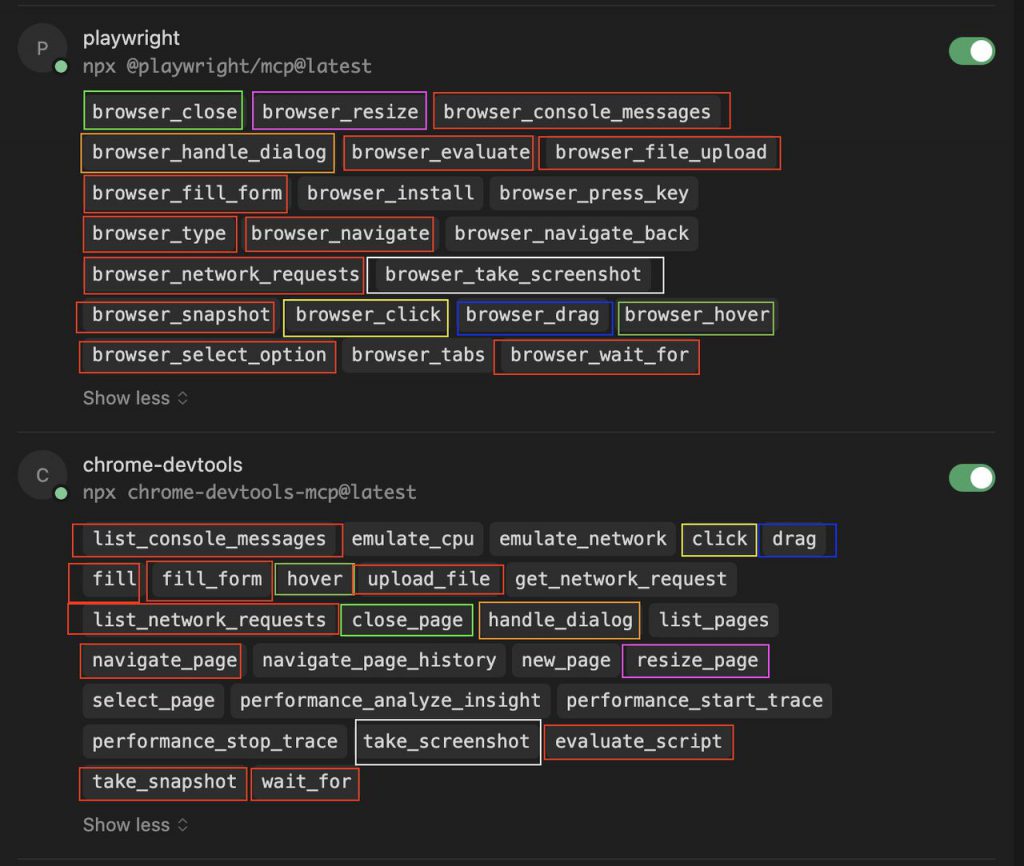Model Context Protocol (MCP) is great for AI-powered browser automation and debugging, with notable implementations from Playwright MCP by Microsoft and Chrome DevTools MCP by Google. These two frameworks enable AI agents to interact with browsers through structured commands, offering unique strengths and functionalities.
⚠️ Caution: There are many similar tools (commands), and running both MCPs simultaneously may cause confusion and return inconsistent results.
How MCP Works
Each MCP server exposes its commands with names, parameters, and descriptions (similar to an OpenAPI schema).
Example:
- Playwright –
browser_click: “Click an element on the page using a selector” - DevTools –
click: “Click an element at a given position or selector”
The MCP client (Cursor, Claude, etc.) reads these definitions and stores them in its context.
The choice of which command to use isn’t hard-wired. MCP clients leverage AI reasoning + tool metadata + feedback to pick the best command. If two tools overlap, they rely on naming clarity, specificity, and sometimes user configuration to disambiguate.
Key Differences Between MCP Servers
| Feature | Playwright MCP | Chrome DevTools MCP |
|---|---|---|
| Engine | Based on Playwright; supports Chromium, Firefox, and WebKit | Built on Chrome DevTools Protocol; compatible with Chrome/Chromium only |
| Focus | Cross-browser automation, test generation, scenario execution | Debugging, performance tracing, live browser introspection |
| Data Access | Accessibility tree snapshots for semantic UI context | DevTools-level data: console logs, network requests, performance insights |
| Performance Tools | Limited built-in profiling capabilities | Extensive tracing and analysis functionalities |
| Browser State | Can initiate fresh sessions or maintain state using Playwright | Connects directly to an active Chrome instance |
| API Design | Commands prefixed (e.g., browser_click, browser_evaluate) | Simpler command names (e.g., click, evaluate_script, navigate_page) |
Similarities
- Both frameworks support fundamental browser automation tasks: clicking, navigation, form filling, file uploads, script evaluation, and screenshots.
- They integrate seamlessly with MCP-aware AI clients like Copilot, Claude, and Cursor.
- Both provide structured feedback beyond raw screenshots, facilitating adaptive AI-driven workflows.
Choosing the Right Tool
- Playwright MCP: Ideal for cross-browser automation and test execution.
- Chrome DevTools MCP: Best for in-depth debugging, performance analysis, and Chrome-specific insights.




